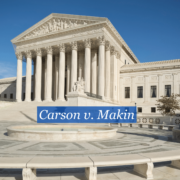PioneerLegal Gains Access to MBTA Pension Arbitration Award After Seven-Month Process
Award increases age at which T employees can collect full pension, gives retirees 3 percent cost of living adjustment
BOSTON, April 26, 2023 – After a more than seven-month struggle, PioneerLegal, a public interest law firm, has gained access to an important August 2022 arbitrator’s decision about a dispute between the MBTA and its largest union, the Carmen, over the severely underfunded MBTA Retirement Fund (MBTARF).
“I’m proud that our work allowed this important decision to become public,” said PioneerLegal attorney John La Liberte. “But it’s troubling that it would take more than seven months for a document that affects so many people to see the light of day.”
Unlike in the state retirement system, basic tenets of the MBTARF, such as employer and employee contributions and retirement age, are negotiated by the parties.
The MBTARF has been in free fall in recent years. In 2007, pension costs accounted for 9 percent of payroll, but by 2021 they had risen to 24 percent. Despite this dramatic funding increase, the funded ratio fell from 75 percent in 2009 to 54 percent in 2021, with a $1.4 billion unfunded liability.
The arbitrator ruled that for MBTA employees under 60 years old with five or more years of service, the age for receiving a full pension will be raised to 65. Pensions would be reduced by 6 percent per year for each year before 65, which will save over $12 million annually.
Previously, MBTA employees hired before December 6, 2012, could receive a full pension after 23 years of service, regardless of age. The policy is one of the main reasons why the system has more retirees collecting pensions than employees paying in.
Retirees were granted a 3 percent cost of living adjustment affective July 1, 2018, and arbitrator Elizabeth Neumeier maintained the status quo on a number of other issues of disagreement between the MBTA and the Carmen.
Release of the award came only after a long and tortuous process. On September 3, 2022, PioneerLegal submitted a public records request to the MBTA for the decision, which is dated August 26. The T failed to respond by September 23, as required under Massachusetts public records law.
On that date, the Carmen’s Union filed a lawsuit challenging the arbitrator’s award.
On October 6, Pioneer submitted an appeal to the Massachusetts supervisor of records. This time, the MBTA responded, claiming the award was exempt from disclosure.
PioneerLegal filed a second appeal on October 25, but the supervisor of records declined to opine on the substance of the matter.
On December 15, 2022, PioneerLegal filed suit in Superior Court to compel release of the award. The court denied the motion on March 30, 2023.
Just last week, after PioneerLegal—now known as Pioneer Public Interest Law Center— petitioned a single justice of the Appeals Court to reverse the Superior Court decision, the MBTA produced the award.
“Sadly, this is a case where Massachusetts earned its reputation for government opacity,” said Pioneer Institute Executive Director Jim Stergios. At a time when the MBTA faces declining ridership and growing deficits, taxpayers deserve to know about the additional threat the pension fund poses to the T’s fiscal stability.”
Pioneer Public Interest Law Center (PPILC) is a nonpartisan, public interest law firm that defends and promotes educational options, accountable government, and economic opportunity across the Northeast. PPILC achieves its mission through legal research, amicus briefs, and litigation.

